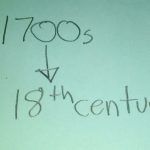 Someone asked me if it were true that I had researched a family back to the 17th century. I responded that I only had the family back to the mid-1700s. The 1700s are not the 17th century, they are the 18th century. In a similar fashion, the 1800s are the 19th century, the 1900s are the 20th century, etc.
Someone asked me if it were true that I had researched a family back to the 17th century. I responded that I only had the family back to the mid-1700s. The 1700s are not the 17th century, they are the 18th century. In a similar fashion, the 1800s are the 19th century, the 1900s are the 20th century, etc.
The problem?
The 1st century was those years from year 1 through year 100.
Genealogy Tip of the Day is proudly sponsored by GenealogyBank. Try their “GenealogyBank Search” and see what discoveries you make.







4 Responses
Which is why the new millennium didn’t start until January 1, 2001. Even when I drew it on paper, people still did not get it!!!
I understand completely. A rough analogy is trying to convince people that if 10 and 20 are included, there are 11 numbers between 10 and 20.
I completely disagree. The current calendar is a compilation of many changes. No one REALLY knows when times began. Rumor has it that the beginning of Christianity date is not correct.
Also, we tend to count from number one. However, computers count. from zero – nine, which equals a decade.
Finally, we have absolute PROOF that the world celebrated the new century on January 1, 1800 and not in 1801.
When 99% of the world disagrees with you, clinging to a notion that we should have waited until January 1, 2001 is a waste of energy
When time begins is a discussion beyond the intent of this blog. That said, common convention is that a reference to the 17th century indicates the century beginning with a “16.” The intent of the tip was to remind people that reading that something was an 18th century practice (or some similar phrase) was indicating something happened in the 1700s and not the 1800s.